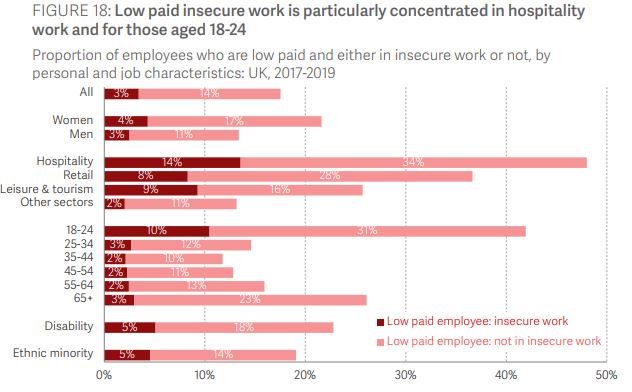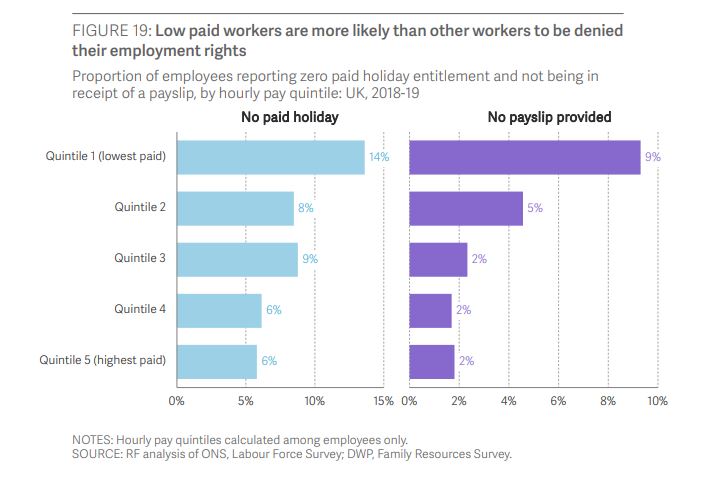COVID-19 impacted low-paid workers most, says UK think tank
How can we make the future of work fairer?
Why You Should Care
The pandemic has impacted everyone's lives, but it has disrupted the work of the lowest-paid the most, according to research by the Resolution Foundation.
These low-paid workers are facing huge amounts of uncertainty and insecurity in their jobs as a result of the crisis.
So how can the UK's economic recovery benefit everyone, especially the lowest paid in society?
The COVID-19 pandemic has disrupted everyone’s lives, but the extent of the negative impact has not been shared equally.
Research by UK think tank the Resolution Foundation has found that low-paid workers in the UK have faced greater health and economic risks during the pandemic than those in higher paid jobs.
Those working in the caring and leisure service sectors were three times more likely to die from COVID-19 than those in higher paid occupations.
In addition, low-paid workers across all sectors were also three times more likely to experience a negative impact on their work as a result of the pandemic. In March 2021, 21% of workers in the bottom weekly pay quintile had either lost their job, had their hours or pay cut, or been furloughed as a result of the crisis – this compares to 7% of the highest earnings quintile.
This makes sense given that COVID-19 has a very sectoral impact where the lowest paying sectors – retail, hospitality and leisure – have been subjected to the greatest restrictions over the past year. In fact, output for the lowest paying sector – hospitality – fell by 85% compared to the end of 2019.
Focusing on the future COVID-19 recovery
Despite this bleak picture, the Resolution Foundation’s report says there are reasons for optimism, particularly as the UK’s COVID-19 crisis eases and the economy begins to open up.
Furlough is on the decline, and particularly in the lowest paying sectors. For instance, rates of full or partial furloughing in hospitality fell from 58% in March to 48% in April.
In addition, it seems the workers that have been furloughed are largely returning to work. The study found that 44% returned to their previous jobs, while 12% found new jobs: 7% of these were in a new sector. In addition, 34% were still furloughed and 7% were no longer working. This leaves only 3% finding themselves unemployed after being let off furlough.
However, the foundation advises that the government shouldn’t just assume that the reopening of the economy is sufficient to build back better. Instead, there is a need to ensure that future economic recovery and growth benefits everyone in the UK, and particularly the lowest paid workers.
Its report states that “a strong recovery for low paid workers would mean one which sees improvements in both pay and job quality”. This is important to note since there is a worry that the future of work will be one where there is no improvement in – and perhaps even a deterioration in – the quality of work and violation of workers’ rights.
This is particularly concerning since “the security of the jobs on offer to low paid workers was already at unacceptably low levels before the crisis”, according to the Resolution Foundation.
In 2019, 20% of low-paid workers were in an insecure job (aka on a zero-hour contract or a temporary contract although the worker could prefer a permanent contract); this compares to only 6% of higher paid workers.

In addition, lower-paid workers are less likely to have certain employment rights, including holiday pay and a payslip. While 14% low paid workers did not receive holiday pay, only 6% of higher-paid workers were in this position. Not having a payslip was reported for 9% of low-paid workers, but only 2% of high-paid workers.

Recommendations
To tackle these concerns, the Resolution Foundation calls on the UK Government to introduce its employment bill as soon as possible.
The Conservative party’s December 2019 manifesto contained plans for a single enforcement body to clarify worker status and allow them to request basic rights, as well as the introduction of a right to request a contract that reflects the worker’s normal hours. The foundation hopes these measures may become part of the upcoming employment legislation.
However, this alone won’t go far enough. Therefore, the foundation calls on the government to go further and ensure workers aren’t subjected to one-sided flexibility that suits their employer, but not them.
A good place to start would be protecting workers from last-minute changes to their shifts by providing schedules two weeks in advance. This should be accompanied by compensation where shifts are canceled or hours are reduced within that two-week window.
These types of measures will not be too burdensome for employers to implement, and won’t impact the demand for labor, which companies may be concerned about, according to the foundation. This is because other countries, including Nordic countries like Norway and Finland, have implemented similar measures effectively and this move has supported high employment.
Sign up to the UNLEASH Newsletter
Get the Editor’s picks of the week delivered straight to your inbox!

Chief Reporter
Allie is an award-winning business journalist and can be reached at alexandra@unleash.ai.
